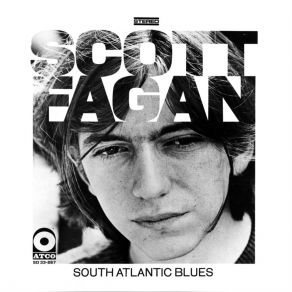South Atlantic Blues (Bonus Tracks Version)
Download links and information about South Atlantic Blues (Bonus Tracks Version) by Scott Fagan. This album was released in 1968 and it belongs to Blues, Rock, Folk Rock, Pop, Songwriter/Lyricist genres. It contains 15 tracks with total duration of 55:28 minutes.

|
|
|---|---|
| Artist: | Scott Fagan |
| Release date: | 1968 |
| Genre: | Blues, Rock, Folk Rock, Pop, Songwriter/Lyricist |
| Tracks: | 15 |
| Duration: | 55:28 |
| Buy it NOW at: | |
| Buy on iTunes $9.99 | |
Tracks
[Edit]| No. | Title | Length |
|---|---|---|
| 1. | In My Head | 4:09 |
| 2. | Nickels and Dimes | 2:18 |
| 3. | Crying | 4:27 |
| 4. | The Carnival Is Ended | 4:07 |
| 5. | South Atlantic Blues | 4:48 |
| 6. | Nothing but Love | 2:40 |
| 7. | Tenement Hall | 4:47 |
| 8. | In Your Hands | 3:20 |
| 9. | Crystal Ball | 3:52 |
| 10. | Madame-Moiselle | 4:40 |
| 11. | They Think She's Crying Cause She's Happy (Bonus Track) | 3:41 |
| 12. | When You're Lonely and You're Blue (Bonus Track) | 3:53 |
| 13. | Bonua (Bonus Track) | 2:29 |
| 14. | I've Been So Lonely for So Long (Bonus Track) | 3:31 |
| 15. | All for the Sake of Love (Bonus Track) | 2:46 |
Details
[Edit]Scott Fagan made his way to New York City when he was just shy of 20, finding a place in a Greenwich Village still processing the aftershocks of Bob Dylan and the Beatles. Operating on the edges of the fringe — he played a few shows with Jimi Hendrix — Fagan caught the attention of Doc Pomus and Mort Shuman, who managed the young singer/songwriter, leading him to have a few sessions for both Columbia and Bert Berns' Bang before he came close to landing a contract with Apple but lost out to James Taylor. His consolation prize wasn't bad: he recorded the full-length South Atlantic Blues for Atco in 1968. Upon its release, South Atlantic Blues essentially disappeared but Jasper Johns happened upon the LP and loved it so much he created three pieces called Scott Fagan Record, which eventually found their way into the collections of the Met, MOMA, and the Walker Art Center, and that wasn't Fagan's only connection to high art: decades later, he discovered he was the biological father of Stephin Merritt, the singer/songwriter behind the Magnetic Fields.
All of this provides plenty of legend for South Atlantic Blues but, fortunately, the album is strong enough to warrant a fair amount of this retrospective praise. South Atlantic Blues floats in from the same hazy plane as Astral Weeks and Tim Buckley's Goodbye and Hello, a record where the compositions often are canvases for emotions delivered through either Fagan's quivering voice or the lush strings that threaten to envelop him. Unlike those aforementioned touchstones, South Atlantic Blues does indeed have trace elements of blues as suggested by its title: it's rife with horn charts and, occasionally, the songs are trimmed so they inadvertently reveal their soul underpinnings. Usually, though, South Atlantic Blues merely floats along in its own slipstream, finding strength in its own melancholy but never diving into darkness; it's music for either dawn or twilight, the moments when consciousness instinctually turns inside out. Its appeal lies entirely in this sense of otherness —it is unquestionably an album of its time, an era when major labels would throw this amount of effort and money into something so idiosyncratic, but it also exists in its own space, a record that was meant to be stumbled upon, to be your own favorite album and nobody else's.